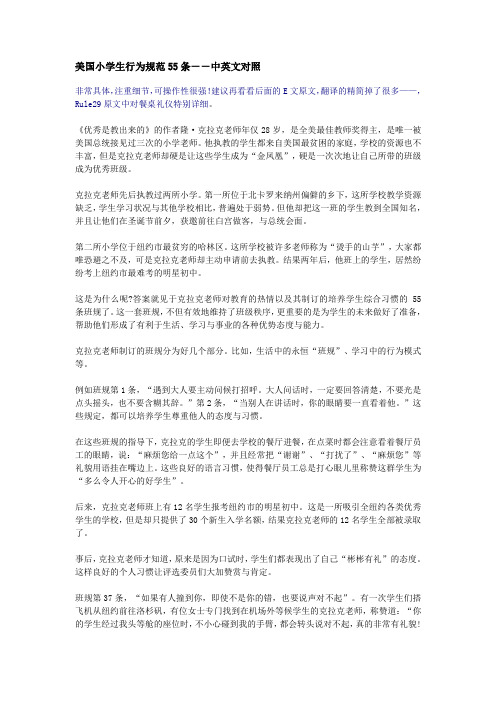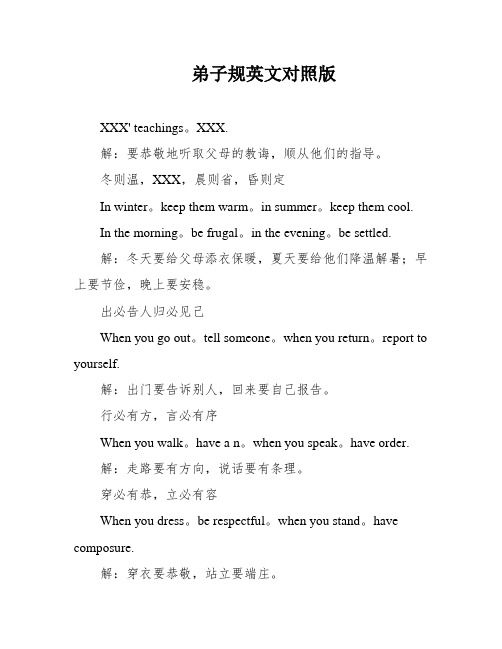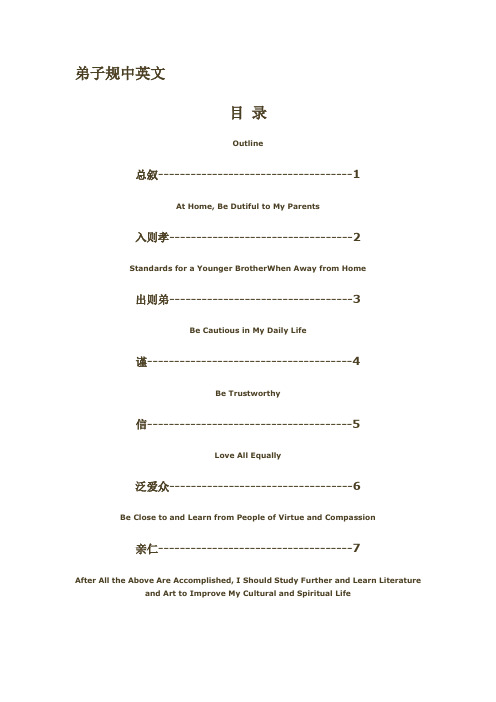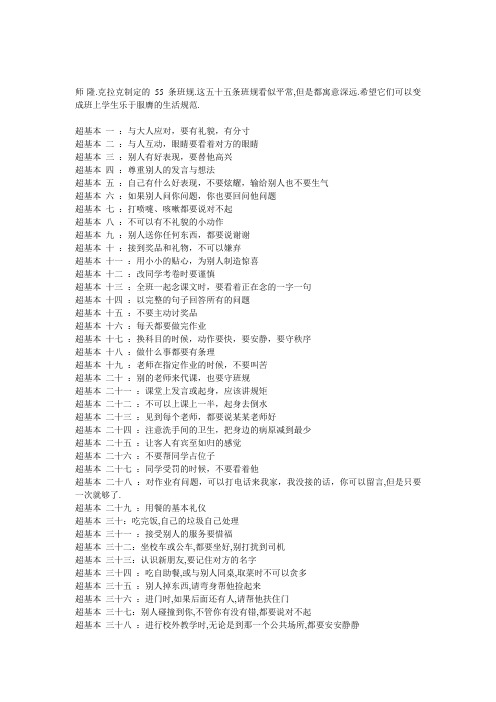美国弟子规
美国小学生行为规范中文修改

美国小学生行为规范55条--中英文对照非常具体,注重细节,可操作性很强!建议再看看后面的E文原文,翻译的精简掉了很多——,Rule29原文中对餐桌礼仪特别详细。
《优秀是教出来的》的作者隆·克拉克老师年仅28岁,是全美最佳教师奖得主,是唯一被美国总统接见过三次的小学老师。
他执教的学生都来自美国最贫困的家庭,学校的资源也不丰富,但是克拉克老师却硬是让这些学生成为“金凤凰”,硬是一次次地让自己所带的班级成为优秀班级。
克拉克老师先后执教过两所小学。
第一所位于北卡罗来纳州偏僻的乡下,这所学校教学资源缺乏,学生学习状况与其他学校相比,普遍处于弱势。
但他却把这一班的学生教到全国知名,并且让他们在圣诞节前夕,获邀前往白宫做客,与总统会面。
第二所小学位于纽约市最贫穷的哈林区。
这所学校被许多老师称为“烫手的山芋”,大家都唯恐避之不及,可是克拉克老师却主动申请前去执教。
结果两年后,他班上的学生,居然纷纷考上纽约市最难考的明星初中。
这是为什么呢?答案就见于克拉克老师对教育的热情以及其制订的培养学生综合习惯的55条班规了。
这一套班规,不但有效地维持了班级秩序,更重要的是为学生的未来做好了准备,帮助他们形成了有利于生活、学习与事业的各种优势态度与能力。
克拉克老师制订的班规分为好几个部分。
比如,生活中的永恒“班规”、学习中的行为模式等。
例如班规第1条,“遇到大人要主动问候打招呼。
大人问话时,一定要回答清楚,不要光是点头摇头,也不要含糊其辞。
”第2条,“当别人在讲话时,你的眼睛要一直看着他。
”这些规定,都可以培养学生尊重他人的态度与习惯。
在这些班规的指导下,克拉克的学生即便去学校的餐厅进餐,在点菜时都会注意看着餐厅员工的眼睛,说:“麻烦您给一点这个”,并且经常把“谢谢”、“打扰了”、“麻烦您”等礼貌用语挂在嘴边上。
这些良好的语言习惯,使得餐厅员工总是打心眼儿里称赞这群学生为“多么令人开心的好学生”。
后来,克拉克老师班上有12名学生报考纽约市的明星初中。
弟子规英文对照版

弟子规英文对照版XXX' teachings。
XXX.解:要恭敬地听取父母的教诲,顺从他们的指导。
冬则温,XXX,晨则省,昏则定In winter。
keep them warm。
in summer。
keep them cool.In the morning。
be frugal。
in the evening。
be settled.解:冬天要给父母添衣保暖,夏天要给他们降温解暑;早上要节俭,晚上要安稳。
出必告人归必见己When you go out。
tell someone。
when you return。
report to yourself.解:出门要告诉别人,回来要自己报告。
行必有方,言必有序When you walk。
have a n。
when you speak。
have order.解:走路要有方向,说话要有条理。
穿必有恭,立必有容When you dress。
be respectful。
when you stand。
have composure.解:穿衣要恭敬,站立要端庄。
扫、拂、治、饭,事事要亲力Sweep。
dust。
clean。
cook - do everything with your own hands.解:打扫、拂尘、整理、做饭,要亲手去做。
Do your best to XXX’ likes。
XXX解:尽力满足父母的喜好,小心避免触及他们的忌讳。
言语有权勿轻发恶语伤人心XXX。
XXX’ feelings。
解:言语具有强大的力量,不要轻率地说话,伤害他人的感情。
有则改勿忘过过则勉再努力If you make a mistake。
correct it and don’t et it。
If you’ve done well。
strive to do even better。
解:犯错要及时改正,不要忘记错误。
做好了一件事,要努力再接再厉。
When your parents are ill。
西方的弟子规55则

西方的《弟子规55则》摘自美国罗恩.克拉克(Clark Ron)的书《优秀是教出来的》(The Essential 55: an Award Winning Educator’s Rules for discovering the successful student in every child)罗恩是美国北卡罗来纳州人,1995年起执教。
他曾在美国很多问题学校任教,现为纽约哈莱姆学校(哈莱姆为纽约著名黑人住宅区)教师。
自从赢得了2001年度迪斯尼美国优秀教师奖以来,罗恩.克拉克一直在全美为各地的教师、家庭教师协会和学校董事会作报告。
他的教学经验被多次录制成广播、电视节目在全美播出,受到广大教师、家长和孩子们的热烈欢迎。
规则1: 和大人沟通时,要有礼貌,有分寸。
规则2: 与人互动,眼睛要看着对方。
规则3:向表现出色的人表示祝贺。
规则4:尊重别人的评论、观点和想法。
规则5:无论成功还是失败,都不能挂在脸上。
规则6:如果别人关心你,你也要同样关心别人。
规则7:打喷嚏或咳嗽时要用手捂住嘴巴,然后说“对不起”。
规则8:不要做出无礼的表现。
规则9:接到别人递的东西,要说:“谢谢!”。
规则10:收到你不喜欢的礼物后,不要对礼物本身或送礼人表现嫌弃。
规则11:顺手做些善意的举动,给别人以特别的惊喜。
规则12:给你的同学判卷,要公正。
规则13:全班同学一起朗读的时候,要全神贯注。
规则14:回答问题时,句子要表达完整,以示尊重。
规则15:不能主动索取奖品。
规则16:每天都要完成全部的家庭作业。
规则17:换科目上课时,动作快,要安静,守秩序规则18:做任何事情都要有条理。
规则19:对老师指定作业时,不允许抱怨或发牢骚。
规则20:别的老师来代课,也要守班规。
规则21:遵守课堂纪律。
规则22:上课时,你不能为了喝水离开教室,你可以带水在教室里喝。
规则23:见到每个老师,都要问好。
规则24:保持个人和浴室卫生,让细菌无处藏身。
西方弟子规——优秀是教出来的

优秀是教出来的__创造教育奇迹的55个细节一位风趣幽默的“麻辣教师”不仅“征服”了一群又一群调皮捣蛋的“问题学生”,而且还在短时间内把他们调教成了品学兼优的好学生,他用了什么绝招?美国最佳教师奖获得者罗恩·克拉克把他“管”学生的55条教学心得能过本书娓娓道来。
他抓住教育过程中容易被人们忽视的细节,既对孩子严格施教,又用爱心和热忱赢得了他们的爱戴和尊敬。
克拉克老师不仅仅将注意力放在提高孩子的学习成绩上,而且更加注重培养孩子良好习惯和教养。
他总结的这55个细节既适用于老师教学生,同样也适用于家长和希望提高个人修养的人们。
RULE 1: Responding to adultsWhen responding to any adult, you must answer by saying “Yes ma’am” or “No, sir.” Just nodding your head or saying any other form of yes or no is not acceptable.与大人应对,要有礼貌,有分寸。
遇到大人,要主动称呼。
大人问你话,你一定要清楚回答:「是/ 不是/ 好/ 不好/ 有/ 没有」或说「我不知道」。
不可以光是点点头或摇摇头,也不可以含糊答『哦』或『嗯』。
RULE 2: Making eye contactMake eye contact. When someone is speaking, keep your eyes on him or her at all times. If someone makes a comment, turn and face that person.与人互动,眼睛要看著对方的眼睛。
看著别人的眼睛。
当别人在讲话时,你的眼睛要一直看著他。
如果旁边有人发言,你就转头去面对那个说话的人。
RULE 3: Congratulating a classmateIf someone in the class wins a game or does something well, we will congratulate that person. Claps should be of at least three seconds in length with the full part of both hands meeting in a manner that will give the appropriate clap volume. ( I know stating it that way makes me sound like a nut, but the kids love it.)别人有好表现,要替他高兴。
双语弟子规

弟子规中英文目录Outline总叙------------------------------------1At Home, Be Dutiful to My Parents入则孝----------------------------------2Standards for a Younger BrotherWhen Away from Home出则弟----------------------------------3Be Cautious in My Daily Life谨--------------------------------------4Be Trustworthy信--------------------------------------5Love All Equally泛爱众----------------------------------6Be Close to and Learn from People of Virtue and Compassion亲仁------------------------------------7After All the Above Are Accomplished, I Should Study Further and Learn Literature and Art to Improve My Cultural and Spiritual Life余力文学--------------------------------8总叙Outlinedìzǐguī shèngrénxùn shǒuxiàotì cìjǐnxìn弟子规圣人训首孝弟次谨信Di Zi Gui or Standards for Being a Good Student and Child33 is a book that was taught by Chinese saints and sages of the ancient past. The book first teaches us how to be dutiful to our parents, and how to be respectful and loving to our siblings.34 It then teaches us how to be cautious with all people, matters, and objects in our daily lives; how to be a trustworthy person;and to believe in the teachings of the ancient saints andsages.35《弟子规》是中国古圣先贤的教诲。
美国中小学经常背诵的校规 中英文版55 rules

师-隆.克拉克制定的55条班规.这五十五条班规看似平常,但是都寓意深远.希望它们可以变成班上学生乐于服膺的生活规范.超基本一:与大人应对,要有礼貌,有分寸超基本二:与人互动,眼睛要看着对方的眼睛超基本三:别人有好表现,要替他高兴超基本四:尊重别人的发言与想法超基本五:自己有什么好表现,不要炫耀,输给别人也不要生气超基本六:如果别人问你问题,你也要回问他问题超基本七:打喷嚏、咳嗽都要说对不起超基本八:不可以有不礼貌的小动作超基本九:别人送你任何东西,都要说谢谢超基本十:接到奖品和礼物,不可以嫌弃超基本十一:用小小的贴心,为别人制造惊喜超基本十二:改同学考卷时要谨慎超基本十三:全班一起念课文时,要看着正在念的一字一句超基本十四:以完整的句子回答所有的问题超基本十五:不要主动讨奖品超基本十六:每天都要做完作业超基本十七:换科目的时候,动作要快,要安静,要守秩序超基本十八:做什么事都要有条理超基本十九:老师在指定作业的时候,不要叫苦超基本二十:别的老师来代课,也要守班规超基本二十一:课堂上发言或起身,应该讲规矩超基本二十二:不可以上课上一半,起身去倒水超基本二十三:见到每个老师,都要说某某老师好超基本二十四:注意洗手间的卫生,把身边的病原减到最少超基本二十五:让客人有宾至如归的感觉超基本二十六:不要帮同学占位子超基本二十七:同学受罚的时候,不要看着他超基本二十八:对作业有问题,可以打电话来我家,我没接的话,你可以留言,但是只要一次就够了.超基本二十九:用餐的基本礼仪超基本三十:吃完饭,自己的垃圾自己处理超基本三十一:接受别人的服务要惜福超基本三十二:坐校车或公车,都要坐好,别打扰到司机超基本三十三:认识新朋友,要记住对方的名字超基本三十四:吃自助餐,或与别人同桌,取菜时不可以贪多超基本三十五:别人掉东西,请弯身帮他捡起来超基本三十六:进门时,如果后面还有人,请帮他扶住门超基本三十七:别人碰撞到你,不管你有没有错,都要说对不起超基本三十八:进行校外教学时,无论是到那一个公共场所,都要安安静静超基本三十九:去参观别人的地方,要不吝于赞美超基本四十:全校师生开会的时候,不要讲话超基本四十一:接电话时言谈要得体超基本四十二:一趟校外教学结束,要感谢所有随行的老师与家长超祢?四十三:搭乘电扶梯时,要站右边,赶时间的人走左边超基本四十四:列队行进时不可以说话超基本四十五:不可以插队;但看到别人插队不可以大呼小叫,让老师知道就好超基本四十六:看电影时不可以说话超基本四十七:不可以带「多力多滋」来学校超基本四十八:有谁欺负你,让老师知道超基本四十九:自己的理想自己要坚持超基本五十:要乐观,要享受人生超基本五十一:别让将来有遗憾超基本五十二:从错误中学习,继续向前迈进超基本五十三:不管如何,一定要诚实超基本五十四:抓住今天超基本五十五:在你的能力范围内,作最好.最好的人本文来源于枫叶教育网()原文链接:/info/91285-1.htmRon Clark’s “Essential 55 Rules”1.Respond to an adult when spoken to.2.Make eye contact when spoken to.3.Congratulate classmates.4.Respect other students’ comments, opinions, and ideas.5.If you win, do not brag, if you lose, do not show anger.6.If you are asked a question in conversation, ask a question in return.7.Cover your mouth when you sneeze or cough and say excuse me.8.Do not show disrespect with gestures.9.Always say thank you when given something.10.When you receive something, do not insult the gift or the giver.11.Surprise others by performing random acts of kindness.12.When grading other stude nts’ papers, give only the correct grade.13.Follow along when we read together in class.14.Answer all written questions with a complete sentence.15.Do not ask for a reward.16.You must complete your homework every day.17.Subject transitions and moving to different classrooms will be swift, quiet, and orderly.18.Be as organized as possible.19.When homework is assigned, do not moan or complain.20.When a substitute teacher present, all class rules still apply.21.Follow the specific classroom protocols.22.You may bring a bottle of water to class; you may not leave for a drink of water duringclass.23.Know other teachers’ names and greet them in the hall by name.24.Keep yourself and the bathroom clean and germ-free.25.Greet visitors and make them feel welcome.26.Do not save seats in the lunchroom.27.Do not stare at a student who is being reprimanded.28.Call me if you have a question about homework and leave a message –once.29.The ABC’s of etiquette.30.After dining in the cafeteria or elsewhere, be responsible for your trash.31.(Used at his school) In a hotel room, leave a tip for the hotel workers who clean yourroom.32.On a bus, always face forward.33.When meeting new people shake hands and repeat their names.34.When offered food, take only your fair share.35.If someone drops something and you are close to it, pick it up.36.Hold the door for people rather than letting it close on them.37.If someone bumps into you, say excuse me, even if it was not your fault.38.On a field trip, enter a public building quietly.39.On a field trip, compliment the place you are visiting.40.During an assembly, do not speak or call out to friends.41.At home, answer your phone in a polite and appropriate manner.42.When returning from a trip, shake the hands of every chaperone.43.Keep right in the hallways when walking.44.When walking in line, Keep your arms at your sides and move quietly.45.Never cut in line.46.No talking during movie or distance learning.47.Do not bring Doritos into the school building (a joke in his classroom)48.If anyone is bullying you, let me know.49.Stand up for what you believe.50.Be positive and enjoy life.51.Live so that you will never have regrets.52.Learn from your mistakes and move on.53.No matter the circumstances, always be honest.54.Carpe Diem.55.Be the best person you can be.。
弟子规英文版

弟子规英文版英文弟子规《弟子规》原名《训蒙文》,为清朝康熙年间秀才李毓秀所作,其内容采用《论语》“学而篇”第六条“弟子,入则孝,出则悌,谨而信,泛爱众,而亲仁,行有余力,则以学文”的文义,列述弟子在家、外出、接物、待人与学习上应该恪守的守则规范。
其中“弟子”的理解可以与时俱进。
在家指孩子;在学校指学生;在公司指员工;在单位指下级;在社会,指公民。
《弟子规》是集中国传统家训、家规、家教之大成,被誉为人生第一规,是做人之根本。
As one of the most popular primers in China, Guidelines for Children (Dizi Gui) was written by Li Yuxiu in the Qing Dynasty during the reign of the Kangxi Emperor (1661-1722). It is based on the ancient teaching of the Chinese philosopher Confucius that emphasizes the basic requisites for being a good person and guidelines for living in harmony with people. The Chinese version was written in three-character verses for the sake of smooth reading. To keep the original style, the English translation is also written in three-word verses without the loss of content, in order to help the English readers not only understand the text but also capture the essence of Chinese civilization that belongs both to China and to the whole world.Children should abideBy Confucius’ guide:Respect elders ’n parent;Be trustworthy 'n prudent.【释义】《弟子规》这本书是孔子对学生的生活规范。
美国小学生守则和中国小学生守则

美国小学生守则和中国小学生守则美国小学生守则与中国小学生守则Regulations for American Pupils and Middle School Students美国小学生守则1. Always refer to a teacher by title and last name.每次都礼貌地称呼老师,如“ x(姓)老师/主任/校长”。
2. Get to .准时或稍提前进入课堂。
3. Raise your hand when you want to ask a question.先举手, 后提问。
4. You may speak to the teacher from your desk while you are seated.在课堂上,学生可以坐着与老师交流,不一定要起立。
5. When you are absent, you must make up the work you have missed. Ask either the teacher or a classmate for the work.缺课期间,一定要请老师或同学把拉下的学习内容、笔记补上。
6. If you expect to be away from school because of an emergency, tell your teacher in advance and ask for the work you will miss.遇紧急情况需要离开学校时,应提前告知老师并问清楚在离校期间应学的内容和应完成作业。
7. All assignments you hand in must be your own work.所交的作业都必须是自己独立完成的。
8. Never cheat on a test.考试时,决不作弊。
9. If you are having difficulty with a class, schedule an appointment to see the teacher for help. The teacher will be glad to help you.每当在学习中遇到困难时,你应当主动约见任课老师,寻求帮助。
- 1、下载文档前请自行甄别文档内容的完整性,平台不提供额外的编辑、内容补充、找答案等附加服务。
- 2、"仅部分预览"的文档,不可在线预览部分如存在完整性等问题,可反馈申请退款(可完整预览的文档不适用该条件!)。
- 3、如文档侵犯您的权益,请联系客服反馈,我们会尽快为您处理(人工客服工作时间:9:00-18:30)。
美国弟子规
希望孩子从小懂得礼节,是全世界各个国家都致力的一件事,今天请大家跟小编一起来见识一下美国孩子9岁之前需要掌握的25种基本礼节,体味一下美国版的弟子规。
1.When asking for something, say "Please."
向别人询问事情,说“请”。
2.When receiving something, say "thank you."
当接受东西时,说“谢谢”。
3.Don't interrrupt grown-ups who are speaking with each other unless there is an emergency.They will notice you and respond when they are finished talking.
除非有意外,否则切勿打断大人们的交谈,大人谈完话后会注意到你并回答你。
4.If you do need to get somebody's
attention right away, the phrase"excuse
me" is the most polite way for you to enter the conversation.
当你需要他人的注意或想与人谈话,最礼貌的短语是“对不起,打扰了”。
5.When you have any doubt doing something, ask permission first. It ca n save you from many hours of grief later.
当你不确信可不可以做某件事情,最好先征得许可,这样可以避免以后长时间的悔过之痛。
6.The world is not interested in what you dislike. Keep negative opini ons to
yourself,or between you and your friends, and out of earshot of adults.
不要期望全世界都关心你是否喜欢一件事,将负面的意见留给自己或与好朋友们倾诉,不要向大人们诉苦。
7.Don't comment on other people's physical characteristics unless, of cuourse,it's to compliment them, which is always welcome.
不要评论他人的外表,除非是受人欢迎的好评。
8.When people ask you how you are,
tell them and then ask them how they are.
当别人问你可好,回答他们,并问他们可好。
9.When you have spent time at your friend's house, remember to thank his or her parents for having you over and for the good time you had.
当你到朋友家玩时,记住对你朋友的父母说谢谢邀请,也谢谢在一起的好时光。
10.Knock on closed doors and wait to see if there's a response before entering.
门若是关着的,请敲门等候回音,再进去。
11.When you make a phone call, introduce yourself first and then ask i
f you can speak with the person you are calling.
当你打电话时,先介绍自己,然后问可否与你要通话的人交谈。
12.Be appreciative and say “thank you" for any gift you receive. In the age of e-mail, a hand-written thank-you note can have a powerful effect.
收到任何礼物,都要感恩,并说“谢谢”。
在电子邮件的年代,手写的“感谢卡”价值尤显珍贵。
13.Never use foul language in front of adults. Grown-ups already know all those words, and they find them boring and unpleasant.
在大人面前绝不可以说粗话。
大人早就知道这些脏话,他们觉得脏话沉闷又粗鲁。
14.Don't call people mean names.
不要给人起卑劣的绰号。
15.Do not make fun of anyone for any reason. Teasing shows others you are weak,and ganging up on someone else is cruel.
不要因任何原因取笑任何人。
取笑人表明你很软弱,与别人合伙来欺负人是很残忍的事。
16.Even if a play or an assembly is boring, sit through it quietly and pretend
that you are interested. The performers and presenters are doing their best.
即使一场戏剧或集会很乏味,仍然要安静地坐到最后,假装你是感兴趣的,因为表演者和演讲者都在尽全力。
17.If you bump into somebody, immediately say "excuse me."
若不小心碰撞到别人,立即说“对不起”。
18.Cover your mouth when you cough
or sneeze, and don't pick your nose in public.
咳嗽或打喷嚏时,请遮住嘴。
不要当众挖鼻孔。
19.As you walk through a door, look to see if you can hold it open for some one else.
当你穿走门道时,看看你能否为他人扶门。
20.If you come across a parent, a teacher, or a neighbor working on something, as if you can help. If they say"yes", do so -- you may learn something new.
你父母、老师或邻居在做事情时,若你经过,询问是否可以帮助他们,若他们说“可以”,你去帮助他们——你很可能学会做新的事情。
21.When an adult asks you for a favor, do it without grumbling and wit
h a smile.
大人请你帮忙时,带着微笑毫无怨言地去做。
22.When someone helps you, say "thank you". That person will likely wa ntto help you again. This is especially true with teachers!
当别人帮助你时,说“谢谢”。
帮助你的人会更愿意再帮助你。
尤其是对老师而言。
e eating utensils properly. If you are unsure how to do so, ask y our parents to teach you or watch what adults do.
正确地使用餐具。
若不太确信如何使用,问你父母,让他们教你,或观察其他大人是如何使用的。
24.Keep a napkin on you lap; use it to wipe your mouth when necessary.
用餐时,将餐巾纸放膝上,需要时用纸巾擦嘴。
25.Don't reach for things at the table; ask to have them passed.用餐时,不要伸出手去拿桌上的东西;请别人将食物传给你。
